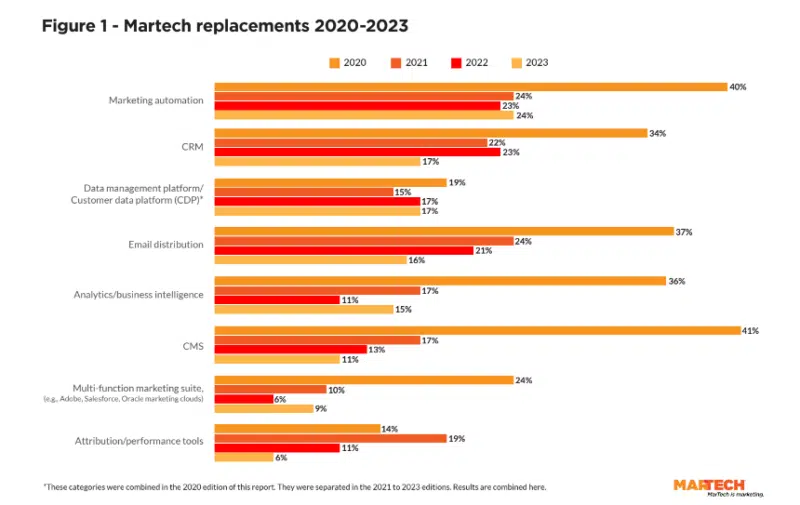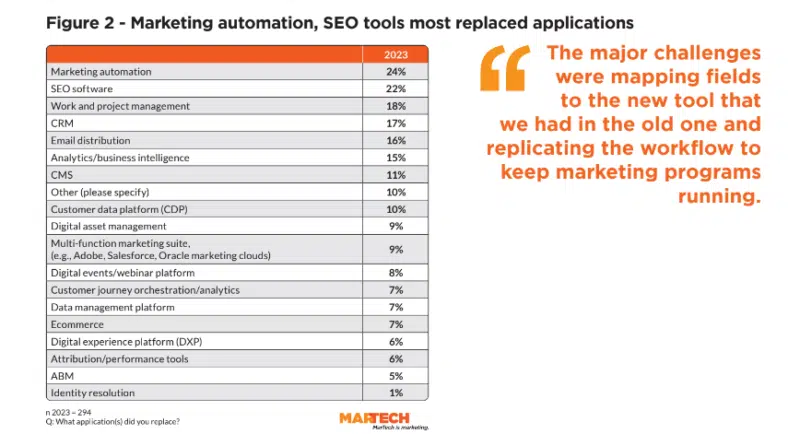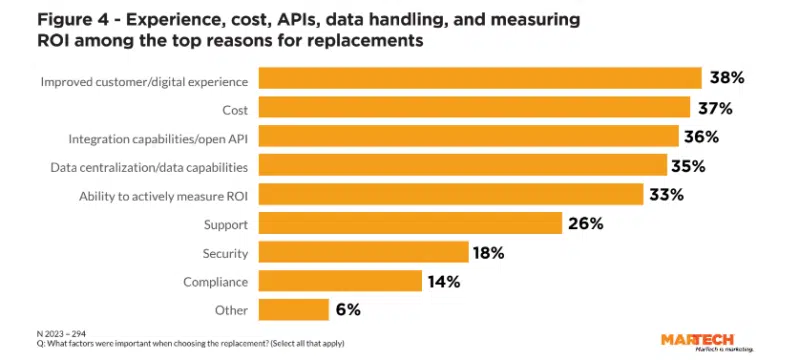The results of the 2023 MarTech Replacement Survey are here
The latest MarTech Replacement Survey provides reason to question whether the pandemic era truly sparked digital transformation.
Judged by frequency of replacing martech applications, COVID-19 might not have been the accelerant for digital transformation despite widespread assumptions to the contrary.
That’s one key takeaway from the 2023 MarTech Replacement Survey. Other key findings include:
- Marketing automation was the most replaced martech application for the third consecutive year.
- 38% of all replacements were aimed at improving the customer experience.
- The growing use of commercial applications is accelerating the rate of replacement.
This is based on over 400 participating respondents.
Did COVID-19 accelerate digital transformation?
It has been widely assumed that one effect of the pandemic — and especially of the initial, widespread lockdown — was to make not only consumers but also B2B buyers reliant on digital channels to research and execute purchases.
As even digitally immature businesses sought to raise their online profiles and boost their digital capabilities, fresh investment in the martech stack was front of mind. That has been the assumption at least and it’s plausible enough.
However, looking back now over four years of data, there is reason to question that conclusion. Our 2020 survey, which asked about replacements in 2019 — i.e. pre-pandemic — shows a much greater frequency of replacement across all major categories. The 2021 survey reflects a sharp decrease in replacements and that slower rate has been consistently reflected by the surveys for subsequent years.
To take just two examples:
- 41% of respondents reported replacing their CMS in 2019 (as seen in the 2020 survey), a number that has steadily dwindled to just 11% in the new survey.
- 40% of respondents reported replacing their marketing automation solution in 2019. The percentage has been in the low twenties ever since.

Marketing automation remains the most replaced
Although the percentage of marketing automation replacements has shrunk, it consistently remains the most replaced solution — apparently for a variety of reasons. We asked selected survey respondents the reason for the switch. Here are two completely different reasons, each of which make sense:
“We were consolidating CRMs because of a merger and the marketing automation tool we selected we felt would better integrate [with our new stack]. The major challenges were mapping fields to the new tool that we had in the old one and replicating the workflow to keep marketing programs running.”
Marketing manager Steve Wagner.
“We outgrew our ESP wanting to build more complex campaigns and integrate the audience selections with the campaigns. We wanted to track customer behaviors on and offline and build campaigns around the customer rather than around the product. We wanted to easily set up cross-channel campaigns based on customer behaviors.”
Program manager Nichole Cook.

Reasons for the replacements
This part of the survey has remained largely consistent over the years we’ve conducted it. Better features and better integrations (at least for commercial applications) remain key drivers and, of course, cost is a factor too — although it has never been number one.
It’s notable that commercial applications replaced other commercial applications 70% of the time. Very few respondents reported replacing a homegrown app with another homegrown app; even fewer replaced a commercial app with a homegrown app (6% and 5% respectively).
Among other things, this surely reflects a steady migration from on-prem to SAAS solutions and the cloud.

We have answers to other questions too
Who champions martech replacements? Does replacing a solution entail replacing the team that used the outgoing solution? How often are solutions replaced? We have answers to these and other questions and a wealth of data to dive into, plus firmographic data on our respondents.
Get the full survey, free and ungated, right here.

2023 MarTech Replacement Survey Results
Find out which martech solutions were being replaced over the last year — and why.
Contributing authors are invited to create content for MarTech and are chosen for their expertise and contribution to the martech community. Our contributors work under the oversight of the editorial staff and contributions are checked for quality and relevance to our readers. MarTech is owned by Semrush. Contributor was not asked to make any direct or indirect mentions of Semrush. The opinions they express are their own.
Related stories
New on MarTech